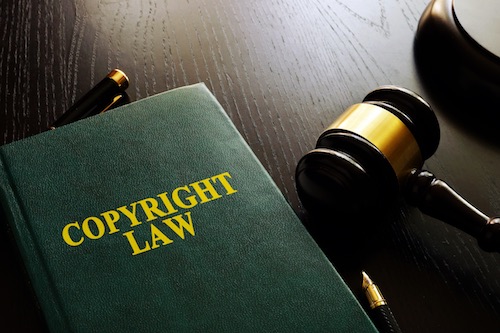“Restating statutory laws could result in judges looking to the Restatement for interpretations that mischaracterize or misrepresent the text of the law as passed by Congress.” – Senator Tillis and Representatives Rouda and Deutch in their recent op-ed for The Hill on ALI’s Copyright Restatement Project
 The American Law Institute (ALI) has submitted a second response stemming from a letter sent by members of Congress last year expressing serious concerns over ALI’s Restatement of Copyright project.
The American Law Institute (ALI) has submitted a second response stemming from a letter sent by members of Congress last year expressing serious concerns over ALI’s Restatement of Copyright project.
In December 2019, Senator Thom Tillis (R-NC) and Representatives Ben Cline (R-VA), Martha Roby (R-AL), Theodore Deutch (R-FL) and Harley Rouda (D-CA) sent a letter to ALI stating that laws created through federal statute like copyright are “ill-suited for treatment in a Restatement” and threaten to muddle the law. The U.S. Copyright Office, the American Bar Association (IP Law Section) and the U.S. Patent and Trademark Office have raised similar concerns.
The letter ultimately requested responses to nine questions seeking clarification on the project by January 3, 2020. In that response letter, ALI Director Richard Revesz told the Congress members that:
- the project was undertaken to aid courts, as are all Restatements;
- that the Copyright Restatement “will focus on those parts of the law that have been the source of significant judicial commentary or disagreement”;
- that the statutory text is controlling in drafting the Restatement;
- that discrepancies are resolved by weighing all of the relevant sources that judges would;
- that “any gap filling of the case law, which would generally involve subsidiary or generally minor matters, must be governed by the statutory language and structure, analogous judicial decisions, and trends in the case law”;
- that the ALI will modify its Restatement to account for subsequent changes to legislation as necessary;
- that the views of the U.S. Copyright Office will be given careful consideration;
- that it has an official procedure for dealing with conflicts of interest and ensuring that Restatements are impartial and nonpartisan; and
- that, while several other Restatement projects addressing federal law are in the works, there currently are no plans for a Restatement project on patent law.
The latest ALI response came February 28. Revesz again explained that “it is not the function of this Restatement or of any of the American Law Institute’s Restatements to rewrite existing statutory law or to say what a better statute would look like. Instead, the Restatement of the Law, Copyright aims to be a resource to the courts, and others, when the statutory text leaves broad scope for judicial interpretation and discretion.”
The letter pointed to the doctrine of fair use as an example of an issue that Congress left to the courts to interpret and develop on a case-by-case basis. Revesz added:
The Restatement of the Law, Copyright can help to bring clarity to the complex and often differing precedents that have emerged from the courts over the more than forty years since the Copyright Act’s enactment. In this sense, our Restatement of the Law, Copyright is no different from our many other Restatements addressing statutory law or our many common law Restatements that clarify and simplify doctrinal lines of cases.
The February 28 letter also included responses to each of the four additional questions posed by the Congress members’ January 15 letter. Revesz indicated that: 1) there was no specific case or course of events that triggered the project, which was approved at its Fall 2014 meeting by the ALI Council; 2) that it will not attempt to restate the entirety of copyright law; 3) that ALI will give the U.S. Copyright Office’s views “the same weight that a judge would give them in deciding a case”; and 4) further expanded on the methodology for deciding how and when to address gaps in the case law or statute.
Just prior to the February 28 ALI response, Senator Tillis and Representatives Rouda and Deutch published a letter in The Hill reiterating their concerns and claiming that the Restatement has the potential to harm American creative industries by “moving judicial interpretations of copyright law away from existing statutes and toward interpretations that would weaken copyright protections for Americans.” They added:
“[T]he ALI has appropriately avoided creating Restatements based on statutory law. Restating statutory laws could result in judges looking to the Restatement for interpretations that mischaracterize or misrepresent the text of the law as passed by Congress.”
The Restatement of the Law, Copyright project is set to be presented to membership during ALI’s 97th Annual Meeting in San Francisco later this month.
Image Source: Deposit Photos
Image ID: 164621466
Copyright: designer491

![[IPWatchdog Logo]](https://ipwatchdog.com/wp-content/themes/IPWatchdog%20-%202023/assets/images/temp/logo-small@2x.png)

![[Advertisement]](https://ipwatchdog.com/wp-content/uploads/2024/04/Patent-Litigation-Masters-2024-sidebar-early-bird-ends-Apr-21-last-chance-700x500-1.jpg)

![[Advertisement]](https://ipwatchdog.com/wp-content/uploads/2021/12/WEBINAR-336-x-280-px.png)
![[Advertisement]](https://ipwatchdog.com/wp-content/uploads/2021/12/2021-Patent-Practice-on-Demand-recorded-Feb-2021-336-x-280.jpg)
![[Advertisement]](https://ipwatchdog.com/wp-content/uploads/2021/12/Ad-4-The-Invent-Patent-System™.png)







Join the Discussion
One comment so far.
Elizabeth Hannah Rader
March 4, 2020 05:50 pmFederal judges have access to libraries of case reporters, codes, legislative history, agency regulations, and other legal materials. They are trained to interpret and apply federal statutes, starting with plain language and considering related materials where appropriate. They know that the ALI’s restatements do not purport to be controlling law but are meant to be helpful to lawyers and judges. It is up to the higher federal courts, not litigants or their elected officials, to review a judge’s interpretation of a provision of the Copyright Act and correct any legal error. Owners of valuable copyrights have top-notch attorneys to brief a court on the weight, if any, it should give to secondary legal materials such as restatements. Any concern that a book will confuse a federal judge should be addressed by advocacy, not by pressuring the author to refrain from publishing that book.